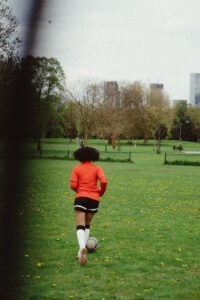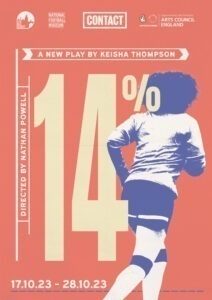If it wasn’t for the inconvenient fact that there are three acts, it would be tempting to describe 14% as a game of two halves. To do so, however, would do the play a great disservice, since it’s exactly such clichés that it’s at some pains to take a scalpel to.
Written by Keisha Thompson, 14% at Contact in Manchester takes the audience along the same tracks as Lauren Fitzpatrick’s Nadia, a player for the England football team, in transit between test results. The first is the one that confirmed her pregnancy, the second the double-edged sword of the precise proportions of her DNA.
The decision to compartmentalise the action – dividing it between the exteriority of a train carriage over-run by an influx of beery football supporters and the interiority of Nadia’s dialogue with her unborn son – bisects the audience into two ‘sittings’, so that each half takes in both vantage points, although in a different sequence.
While it’s easy to appreciate the conceit once it’s possible to marry up the two perspectives, it’s an approach that requires a certain forbearance while installed on the imaginary carriage, a back-stage corridor that invites graffiti-chalked responses to questions about identity while exposing you to the apparently pre-recorded bantering conversation of the cocksure supporters, sometimes surprisingly considered but erupting, too, into a particularly minatory boorishness. For the most part, its soundscape, crafted by Werkha, captures all too accurately the subjective interminability of the delayed commute, and, if this is intentional, it’s also a dramatic device that risks losing the audience’s attention, allowing them to return, sotto voce, to their pre-performance small talk.

Credit: Paddy Clugston
Tellingly however, one sequence cuts through the enforced tedium, as it cuts across both acts. When Nadia recounts her experience of being racially abused in Piccadilly Gardens, the noise seems to drop away. You could hear a pin drop. It’s a riveting moment, and one which suggests the attention that’s been paid to the structured interplay between internal monologue and non-negotiable reality, one that unobtrusively dramatises the difficulty of reconciling the two.
For me, at least, the complementary act felt more successful; perhaps, because it affords the audience the comparative security of remaining seated in their comfort zone, and almost certainly because Fitzpatrick’s presence, fully engaged itself, demands a focus. Her performance draws you into her introspection, getting under the skin in a way that invites empathetic identification. Wrangling with the mixed messaging of Englishness, and the urgency of impending first parenthood, her dialogue with the foetus inside her has the effect of opening up a conversation with the audience itself.
Imagining a voice for Roman, a name it turns out that her unborn son is none too keen on, adds a further layer to the drama. As well as introducing a comedic double act with the unseen male who performs his dialogue, by making the foetus polyglot Thompson hints both at a certain prelapsarian view of human nature as uncorrupted in essence, and, by doing so, insinuates that it’s nurture, rather than specific ratios in a gene sequence, that most constrains identity.
If a glib reading of the subtext might be that hell is other people, especially when you need the toilet, Nadia’s reclamation of the football chant ‘England ’til I die’ speaks of something more nuanced. If we aspire to live with inclusiveness and understanding, we might need to extend the invitation to everyone. England is ours, belonging equally to each and everyone of us. One hundred per cent.
Main image: credit Paddy Clugston




Credit: Kate Davies
For more information about 14%, click here.








